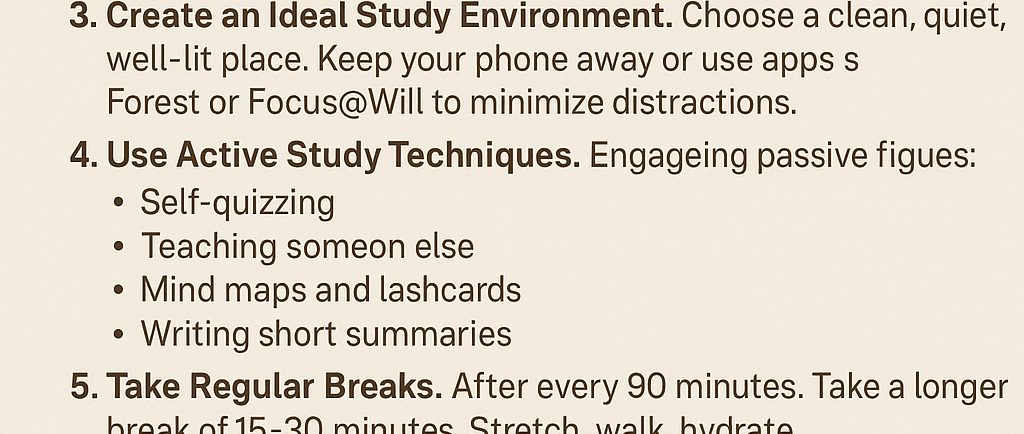How to Study for Long Hours Without Getting Tired or Distracted


Studying for long hours can be challenging, especially when you’re under pressure to perform well. Whether you’re preparing for competitive exams, college tests, or professional certifications, developing the stamina to study for extended periods is crucial. Here’s a comprehensive guide on how to study for long hours effectively without burning out.
1. Start with a Clear Plan
Before you even sit down, map out what you need to cover. Break your syllabus or subject into manageable sections and assign specific time slots to each. A clear roadmap reduces overwhelm and keeps you focused.
Tip: Use techniques like the Pomodoro method (25 minutes study + 5 minutes break) to maintain rhythm and avoid fatigue.
2. Set Realistic Goal
Don’t aim to study 12 hours on day one. Start with smaller targets like 4–5 hours and gradually increase. Unrealistic goals only lead to disappointment and burnout.
3. Create an Ideal Study Environment
Your surroundings play a big role in your focus. Choose a clean, quiet, and well-lit place. Keep your phone away or use apps like Forest or Focus@Will to minimize distractions.
4. Use Active Study Techniques
Reading passively for hours leads to boredom. Engage with the material through:
Self-quizzing
Teaching someone else
Mind maps and flashcards
Writing short summaries
These techniques improve retention and keep your brain active.
5. Take Regular Breaks
The brain needs rest to function at peak levels. After every 90 minutes, take a longer break of 15–30 minutes. Stretch, walk, hydrate, or do a quick meditation.
6. Stay Physically Active
Include light exercises or yoga in your routine. Physical activity increases blood flow to the brain and helps you stay alert during long study sessions.
7. Fuel Your Brain
Eat nutritious foods like fruits, nuts, eggs, and whole grains. Stay hydrated with water or lemon juice. Avoid heavy meals and junk food that make you feel sluggish.
8. Avoid Multitasking
Don’t switch between subjects or check messages in between. Focus on one task at a time. Deep work happens when your brain stays on a single track.
9. Get Enough Sleep
Sacrificing sleep is counterproductive. Sleep consolidates memory and rejuvenates your mind. Aim for 7–8 hours per night.
10. Stay Motivated
Keep reminding yourself why you’re studying. Visualize your goals and successes. Use motivational quotes, reward systems, or study with a group to stay energized.
Bonus Tip: Monitor and Adjust
Keep track of what study patterns work best for you. Everyone’s energy levels peak at different times—some are morning learners, some are night owls. Adapt your routine to match your natural rhythm.
Conclusion
Studying for long hours is less about raw willpower and more about smart strategies. With the right planning, environment, and self-discipline, you can turn long study sessions into productive ones. Remember, consistency beats intensity—study smarter, not just longer.
